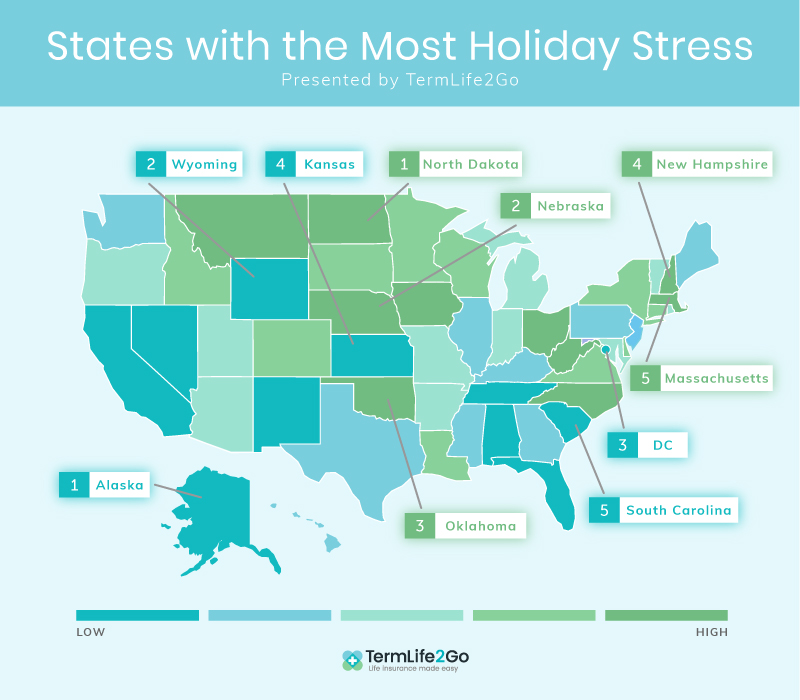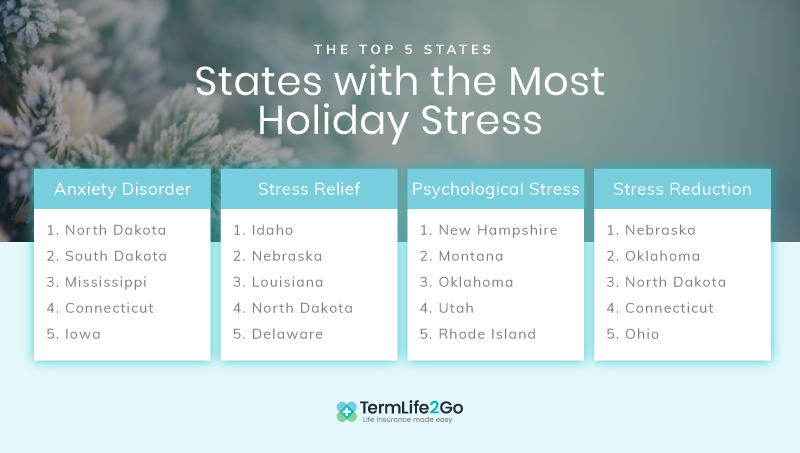Call Today! 888-234-8376
The States with the Most Holiday Stress
Do last-minute gift buying, traveling, and entertaining threaten to turn your holiday spirit from jolly to jaded? Then there’s wrapping up any big projects at work before the end of the year (and wrapping up presents) during shorter, colder days to accomplish it all, and the holidays become a recipe for more than just good cheer. They become the most stressful time of year.
That is, if 2017‘s December spike in Google searches for stress-related terms is any indication.

More than a third of Americans have gone online to self-diagnose symptoms,1 and terms like “psychological stress,” “anxiety disorder,” “stress relief,” and “stress reduction” are common mental health search terms.
Holiday stress isn’t anything new. A 2006 study conducted by the American Psychology Association (APA) found that 36% of Americans experience heightened stress during the holidays.2 The study also found that women and lower-middle-class Americans were hit hardest.
But what about location? Does your location make you likely to stress out this holiday season? We decided to explore that question with the help of—you guessed it—our good friend Google.
Methodology
We identified that Google searches for “stress relief,” “psychological stress,” and related terms among Americans trended upward near the end of November and peaked mid-December. Using Google Trends, we looked for the states with highest search volume around these terms during the 2017 winter holiday period. Our rankings reflect the total (not per capita) combined search volume for the terms “stress relief,” “psychological stress,” “anxiety disorder,” and “stress reduction.”
Key findings
While our list reveals which states' residents are searching for stress-related terms, that doesn't mean folks living there are more or less stressed than others. Still, if you're feeling the pressure to cook, travel, host celebrations, or leave work in time to fit in some last-minute gift shopping, it's good to know you're not alone.
- North Dakota (the state with the third lowest population<sup>3</sup>) showed the highest search volume for stress-related terms over the holiday season last year.
- Nail-biting North Dakota also had the highest search volume for anxiety, followed by neighboring South Dakota, the fourth least populated state.<sup>4</sup>
- Focused on solutions to holiday stress, Nebraska and Idaho had the highest search volume for “stress reduction” and “stress relief,” respectively.
- Nebraska also ranked second highest for searches overall and fell within the top ten for “stress relief” and “anxiety disorder” but had few searches for “psychological stress.”
- Alaska had the lowest search volume for stress-related terms, with only 29 searches for “anxiety disorder” and no searches for the other three terms in this study.
- Similarly, Wyoming came in just behind Alaska for second-lowest holiday stress with 57 searches for “anxiety disorder” and no searches for other terms.
- While every state had some searches for “anxiety disorder,” New Mexico had the fewest at 19.
- New Hampshire had the highest search volume for psychological stress. The next-highest was Montana at 67 (a difference of 33).
- While we couldn’t find a strong correlation between December temperatures and stress-related searches, the northern Midwest has a concentration of high-ranking states.

The takeaway
Unlike the 2006 APA study, we didn’t see any correlation between stress-related searches and median household income5 or gender make-up.6 We also compared our results to rankings for happiness7 and population density,8 but we found little correlation with stress-related Google searches.
It seems that holiday stress can hit just about anyone. So, what can you do?
Well, we Googled that too and found the American Heart Association’s recommendations. Those include doing your best to keep up with regular healthy habits such as eating well and exercising, planning, and taking time to relax amid the hustle and bustle.9
Sources
- Quora, “The Smart Way to Search the Internet for Health Information”
- APA, “Holiday Stress Report”
- USA Today, “Best States for Happiness? WalletHub Study Ranks Hawaii First, West Virginia Last”
- USA Today, “Best States for Happiness? WalletHub Study Ranks Hawaii First, West Virginia Last”
- Census, “Quick Facts”
- Census, “Quick Facts”
- USA Today, “Best States for Happiness? WalletHub Study Ranks Hawaii First, West Virginia Last”
- World Population Review, “US States – Ranked by Population 2018”
- American Heart Association, “Holiday Stress? Try Our Top 5 Tips for a Healthy Holiday Season”


